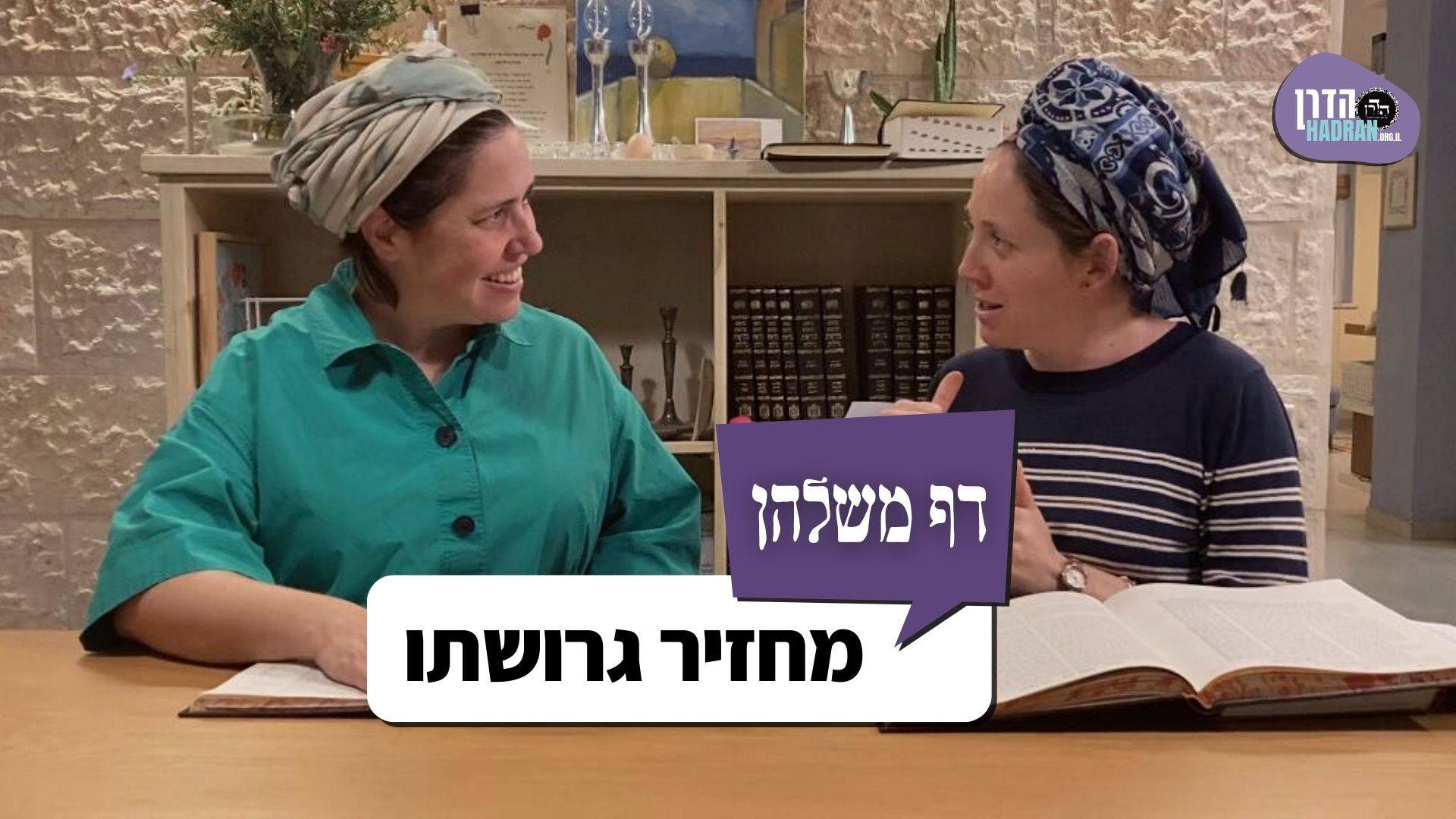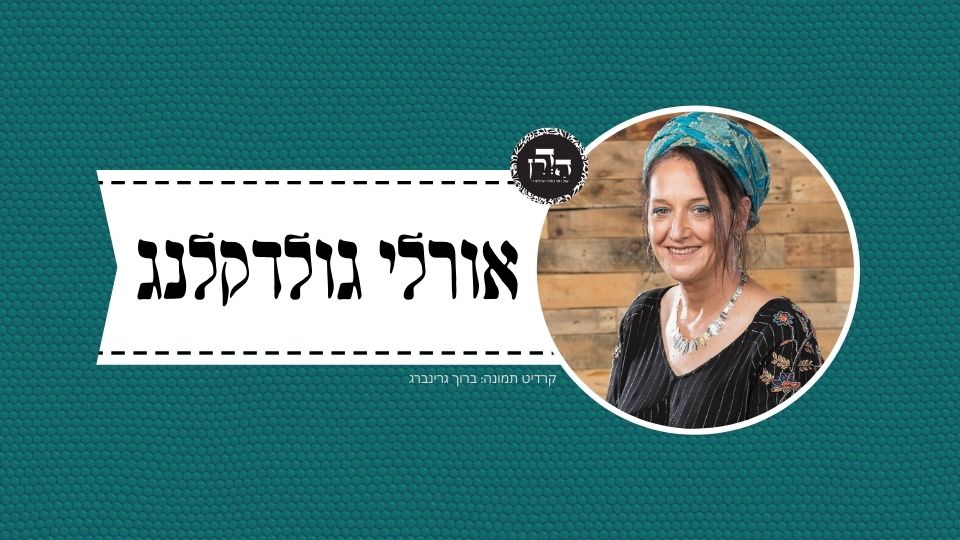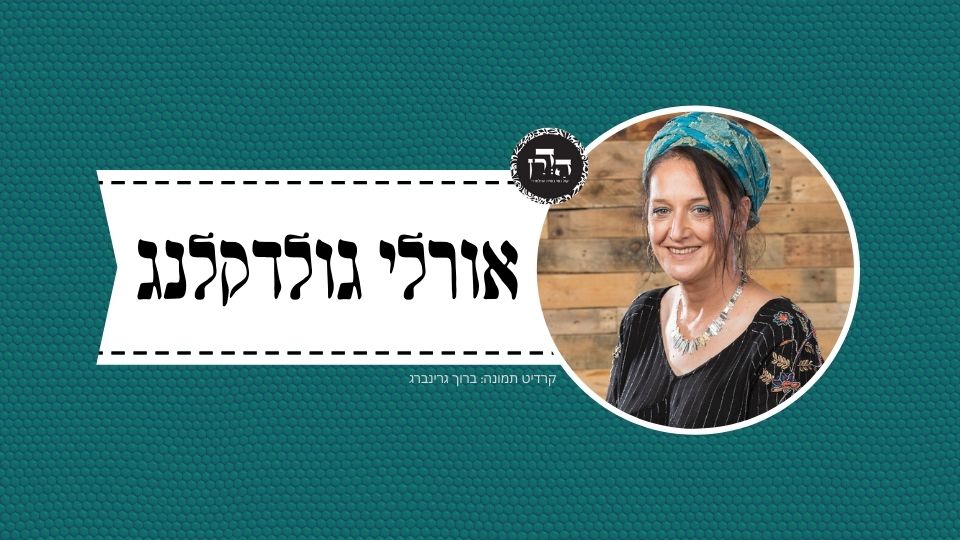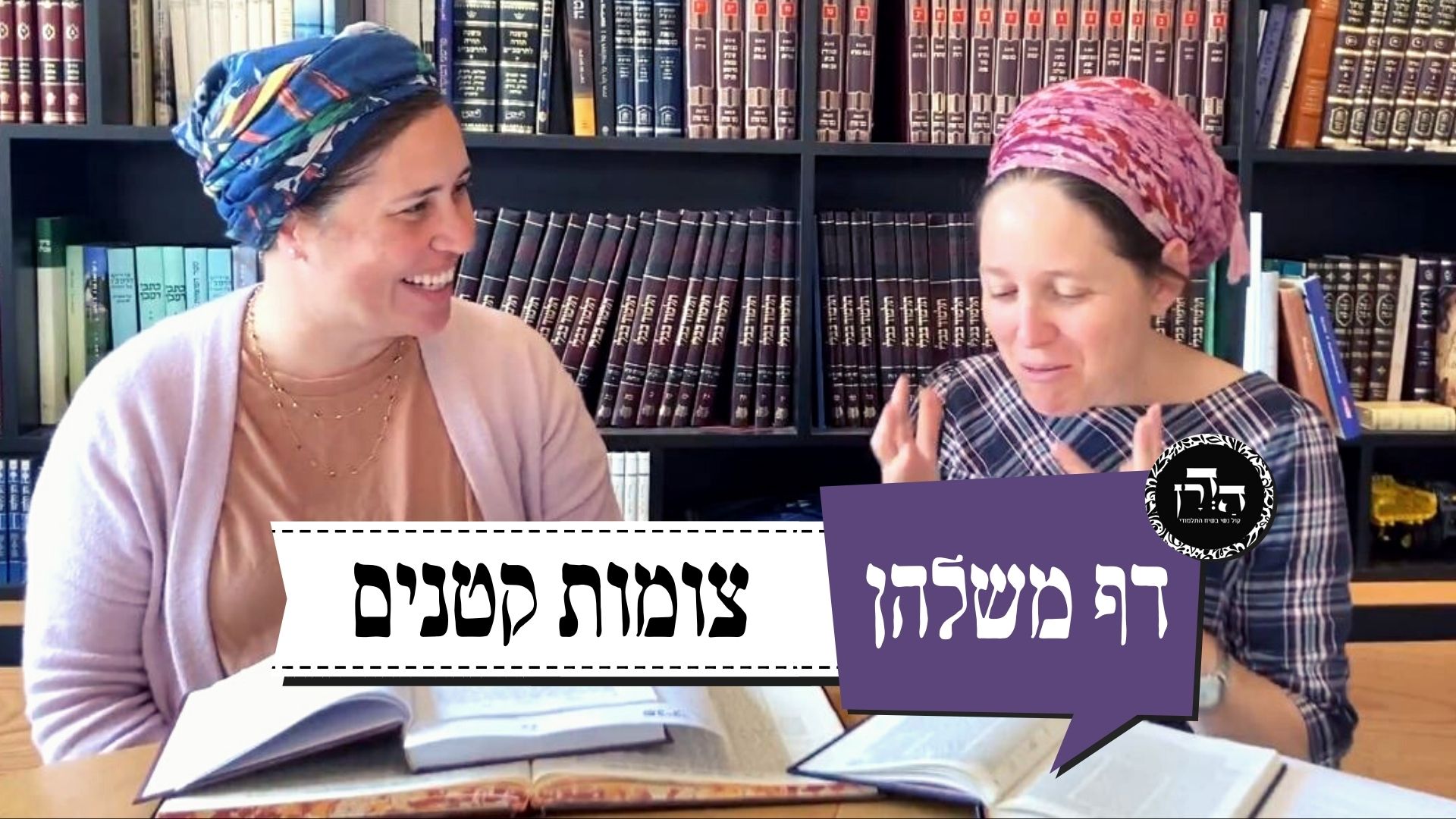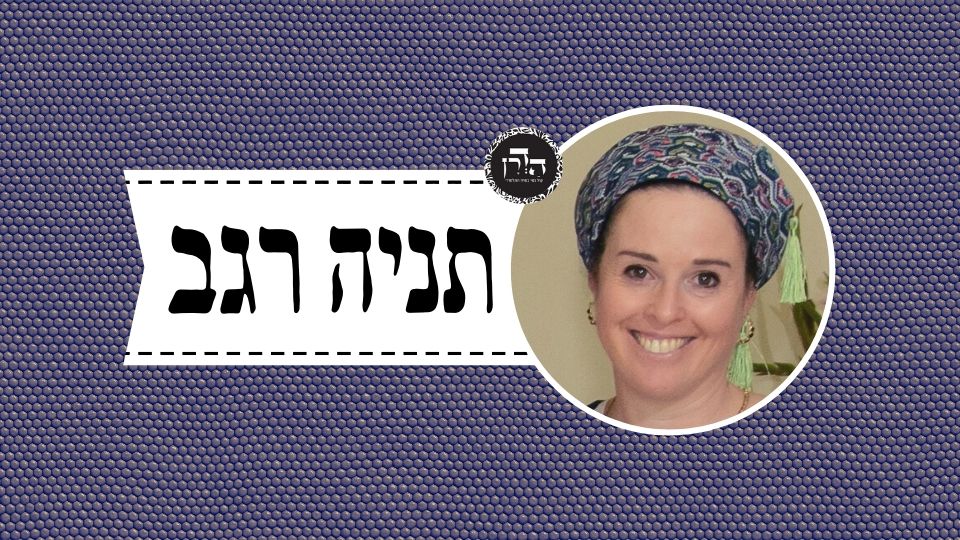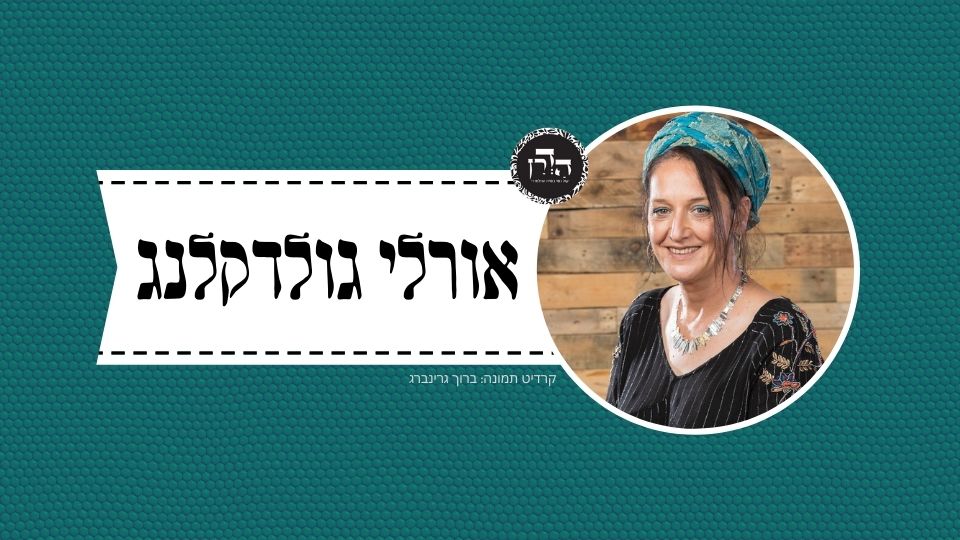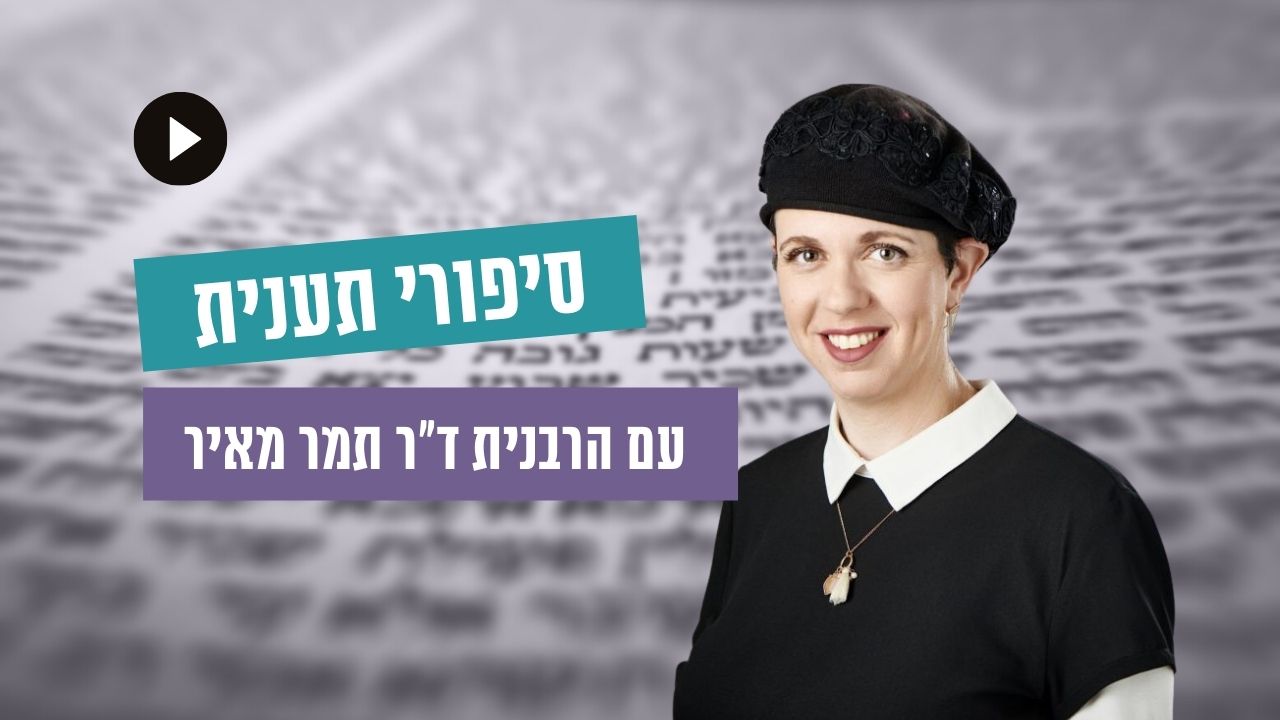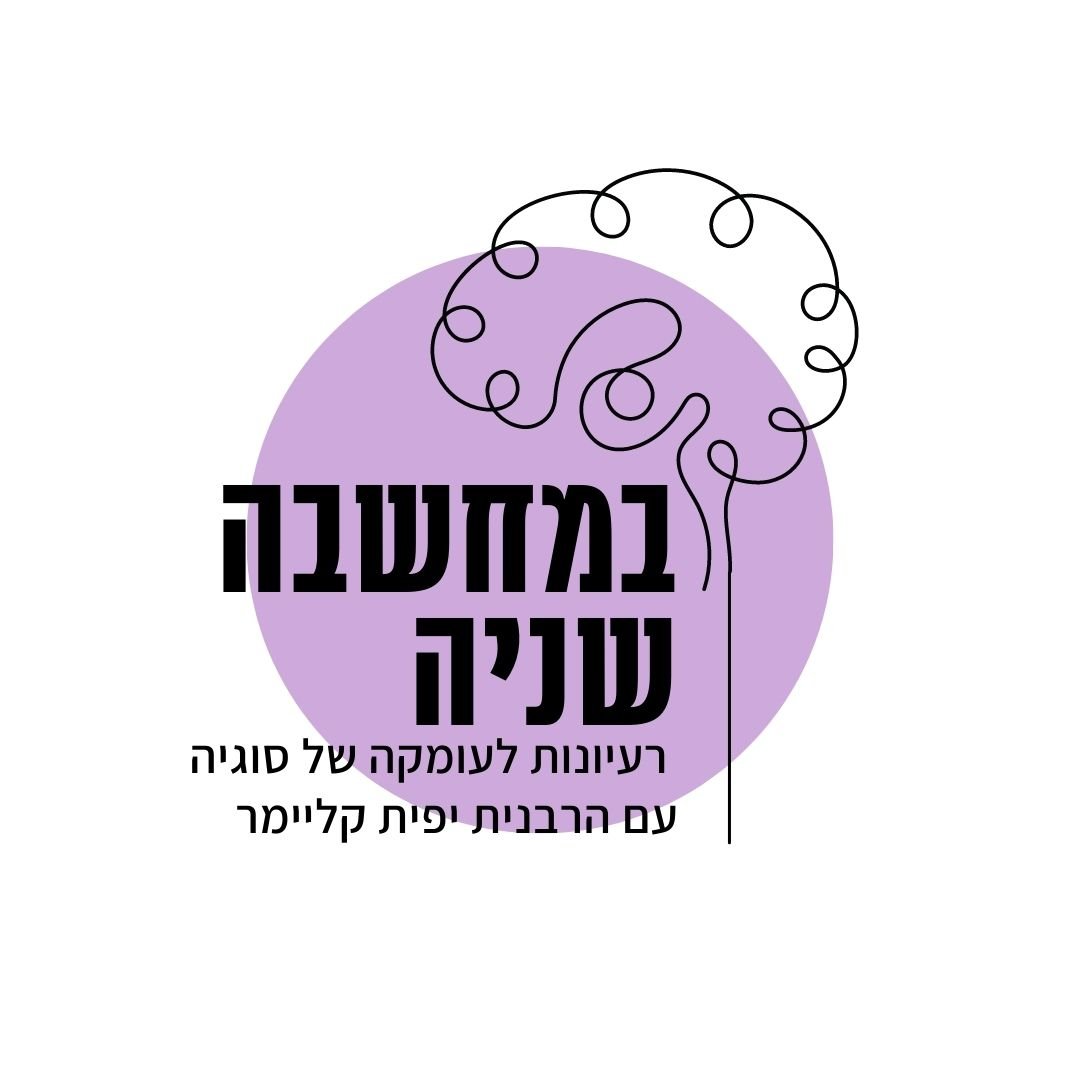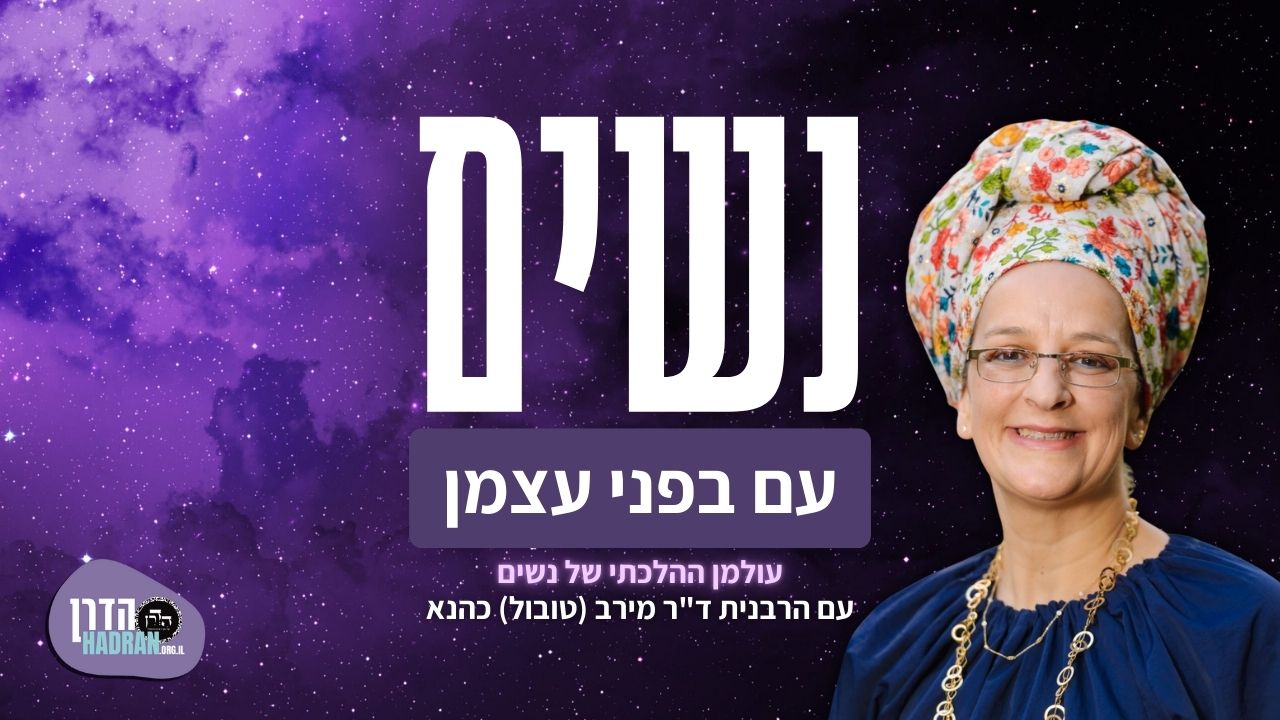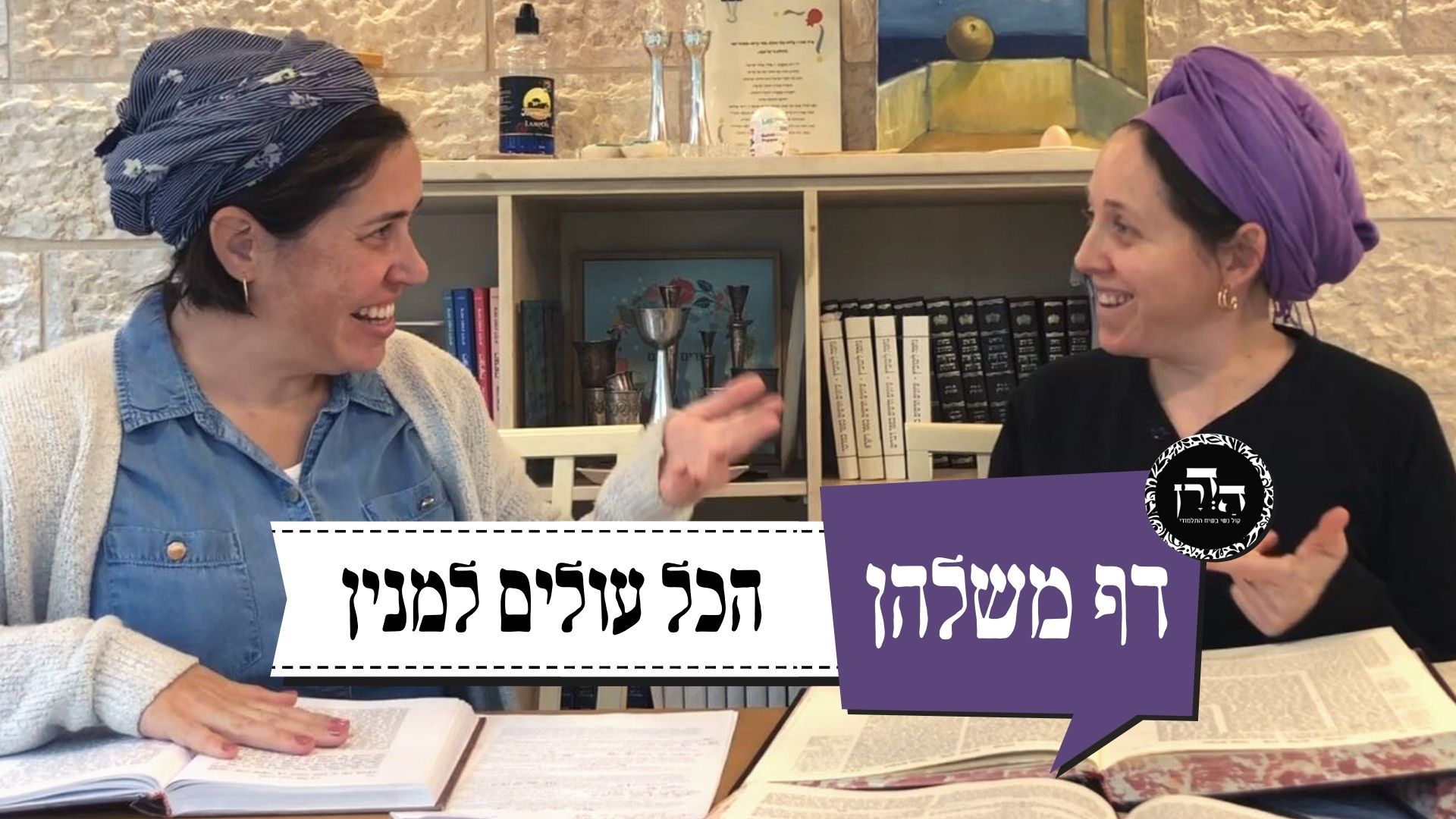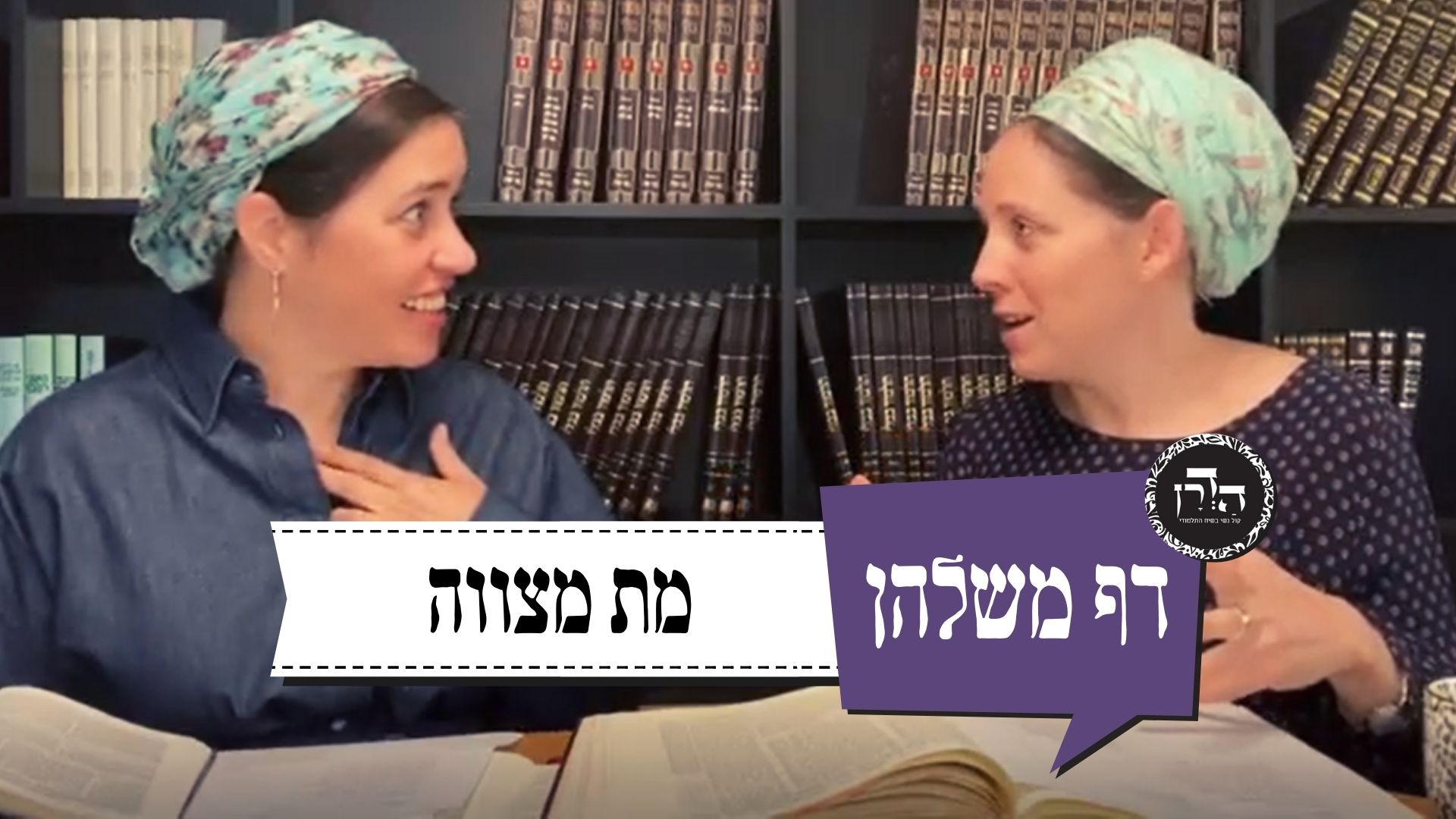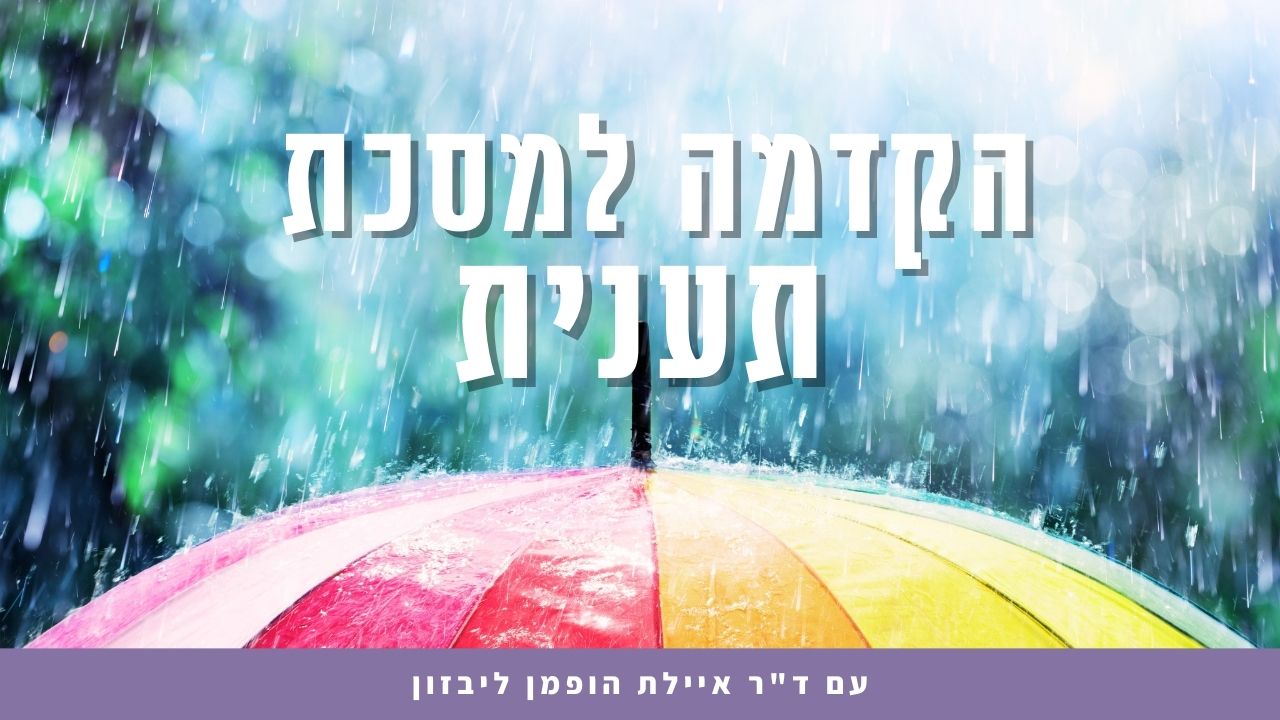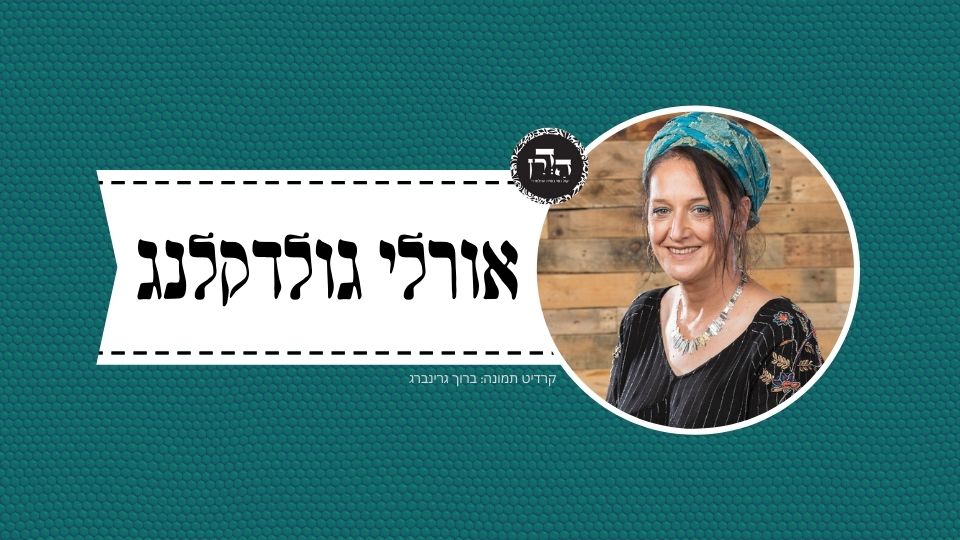מניין לנו שהולכים אחר הרוב? האם אפשר לסמוך על כך שרוב שוחטין מומחים הם? האם אפשר לסמוך על כך ששליח עושה שליחותו? האם צריך כוונה בשחיטה?
הלימוד השבוע מוקדש לזכות ולשלום הַיְימׇנוֹט אֱמוּנָה בַּת באנצ’י (קָסָאוּ) בת 11 שנעלמה במקום מגוריה בצפת, לפני שנתיים, ביום ט”ז אדר תשפ”ד (25.2.24), ולא נודעו עקבותיה.
הלימוד השבוע מוקדש למען ביטחון המדינה, החיילים והאזרחים, ולמען חירותו של העם האיראני. שנזכה בקרוב שיתקיים בנו הפסוק: "לַיְּהוּדִים הָיְתָה אוֹרָה וְשִׂמְחָה וְשָׂשֹׂן וִיקָר”.
הלימוד השבוע מוקדש לזכות וְלִשְׁלוֹם הָיימָנוֹט אֱמוּנָה בַּת באנצ’י (קָסָאוּ), בת 11 שנעלמה במקום מגוריה בצפת, לפני שנתיים, ביום ט”ז אדר תשפ״ד (25.2.24), ולא נודעו עקבותיה. אנו מתפללים שֶׁתִּמָּצֵא וְתוּשַׁב לביתה במהרה!
רוצה להקדיש שיעור?

כלים
הלימוד השבוע מוקדש לזכות ולשלום הַיְימׇנוֹט אֱמוּנָה בַּת באנצ’י (קָסָאוּ) בת 11 שנעלמה במקום מגוריה בצפת, לפני שנתיים, ביום ט”ז אדר תשפ”ד (25.2.24), ולא נודעו עקבותיה.
הלימוד השבוע מוקדש למען ביטחון המדינה, החיילים והאזרחים, ולמען חירותו של העם האיראני. שנזכה בקרוב שיתקיים בנו הפסוק: "לַיְּהוּדִים הָיְתָה אוֹרָה וְשִׂמְחָה וְשָׂשֹׂן וִיקָר”.
הלימוד השבוע מוקדש לזכות וְלִשְׁלוֹם הָיימָנוֹט אֱמוּנָה בַּת באנצ’י (קָסָאוּ), בת 11 שנעלמה במקום מגוריה בצפת, לפני שנתיים, ביום ט”ז אדר תשפ״ד (25.2.24), ולא נודעו עקבותיה. אנו מתפללים שֶׁתִּמָּצֵא וְתוּשַׁב לביתה במהרה!
כלים
העמקה
רוצה להבין מה באמת קורה מתחת לפני השטח של הסוגיה?
שיעורים, פודקאסטים והרחבות של מיטב המורות שלנו יפתחו לך עוד זוויות וכיווני חשיבה.
חדשה בלימוד הגמרא?
זה הדף הראשון שלך? איזו התרגשות עצומה! יש לנו בדיוק את התכנים והכלים שיעזרו לך לעשות את הצעדים הראשונים ללמידה בקצב וברמה שלך, כך תוכלי להרגיש בנוח גם בתוך הסוגיות המורכבות ומאתגרות.
פסיפס הלומדות שלנו
גלי את קהילת הלומדות שלנו, מגוון נשים, רקעים וסיפורים. כולן חלק מתנועה ומסע מרגש ועוצמתי.
חולין יב
פסח וקדשים מאי איכא למימר אלא היכא דאפשר אפשר היכא דלא אפשר לא אפשר ה”נ היכא דאפשר אפשר היכא דלא אפשר לא אפשר:
then with regard to the Paschal offering and sacrificial meat that one is obligated to eat, what is there to say? Rather, according to Rabbi Meir, there is no alternative to saying: Where it is possible to examine the situation it is possible, and the majority is not followed; where it is not possible to examine the situation it is not possible, and the majority is followed. If so, here too, according to the Rabbis, it cannot be proven from the above sources that one follows a non-quantifiable majority ab initio, as perhaps where it is possible to examine the situation it is possible, and where it is not possible to examine the situation it is not possible, and the majority is followed.
א”ר נחמן אמר רב ראה אחד ששחט אם ראהו מתחלה ועד סוף מותר לאכול משחיטתו ואם לאו אסור לאכול משחיטתו
§ Rav Naḥman says that Rav says: In the case of a person who saw one who slaughtered an animal, if the person saw him slaughtering continuously from beginning to end of the act, he is permitted to eat from his slaughter, and if not, he is prohibited from eating from his slaughter.
היכי דמי אי דידע דגמיר למה לי ראה ואי דידע דלא גמיר פשיטא
The Gemara asks: What are the circumstances? If it is a case where the onlooker knows that he is knowledgeable in the halakhot of slaughter, why do I require that the onlooker saw the slaughter? Even if he did not see him slaughter, the onlooker may rely on his slaughter. And if the onlooker knows that he is not knowledgeable in the halakhot of slaughter, it is obvious that only if the person saw him slaughtering from beginning to end he is permitted to eat from his slaughter.
ואלא דלא ידע אי גמיר אי לא גמיר לימא רוב מצויין אצל שחיטה מומחין הן
Rather, perhaps it is a case where the onlooker does not know whether he is knowledgeable or whether he is not knowledgeable. But if that is the case, let us say: The majority of those associated with slaughter are experts in the halakhot of slaughter, and one may rely on his slaughter.
מי לא תניא הרי שמצא תרנגולת שחוטה בשוק או שאמר לשלוחו צא שחוט והלך ומצא שחוט חזקתו שחוט
Isn’t it taught in a baraita: In a case where one found a slaughtered chicken in the marketplace, or where one said to his agent: Go out and slaughter a chicken, and he went and found the chicken slaughtered and he does not know who slaughtered it, its presumptive status is that it was slaughtered properly.
אלמא אמרינן רוב מצויין אצל שחיטה מומחין הן הכא נמי לימא רוב מצויין אצל שחיטה מומחין הן
Apparently, we say: The majority of those associated with slaughter are experts. Here too, in a case where it is unknown whether he is knowledgeable, let us say: The majority of those associated with slaughter are experts.
לעולם דידע דלא גמיר וכגון דשחט קמן חד סימן שפיר מהו דתימא מדהאי שפיר הך נמי שפיר קמ”ל האי אתרמויי איתרמי ליה אידך שמא שהה שמא דרס
The Gemara answers: Actually, the reference is to a case where the onlooker knows that the one slaughtering is not knowledgeable in the halakhot of slaughter, and where he slaughtered one siman before us properly. Lest you say: From the fact that this siman was slaughtered properly, that siman was also slaughtered properly; therefore, Rav teaches us that this is not so. As, perhaps this siman happened to be slaughtered properly for him, but with regard to the other siman, perhaps he interrupted the slaughter or perhaps he pressed the knife, invalidating the slaughter.
בעא מיניה רב דימי בר יוסף מרב נחמן האומר לשלוחו צא ושחוט והלך ומצא שחוט מהו אמר לו חזקתו שחוט האומר לשלוחו צא ותרום והלך ומצא תרום מאי אמר ליה אין חזקתו תרום
Rav Dimi bar Yosef raised a dilemma before Rav Naḥman: With regard to one who says to his agent: Go out and slaughter a chicken, and he went and found the chicken slaughtered, what is the halakha? Rav Naḥman said to him: Its presumptive status is that it was slaughtered properly. And he raised another dilemma: With regard to one who says to his agent: Go out and separate teruma for me, and he went and found that teruma was separated from his produce, what is the halakha? Rav Naḥman said to him: Its presumptive status is not that teruma was separated.
מה נפשך אי חזקה שליח עושה שליחותו אפילו תרומה נמי ואי אין חזקה שליח עושה שליחותו אפילו שחיטה נמי לא
Rav Dimi bar Yosef challenged: Whichever way you look at it, your ruling is problematic. If there is a presumption that an agent performs his assigned agency, that should be the case even with regard to teruma; and if there is no presumption that an agent performs his assigned agency, there should be no such presumption even with regard to slaughter.
אמר ליה לכי תיכול עלה כורא דמלחא לעולם אין חזקה שליח עושה שליחותו ושחיטה אי נמי דילמא אינש אחרינא שמע ואזל שחט רוב מצויין אצל שחיטה מומחין הן תרומה דילמא אינש אחרינא שמע ואזל תרם הוה ליה תורם שלא מדעת והתורם שלא מדעת אין תרומתו תרומה
Rav Naḥman said to Rav Dimi in jest: After you eat a kor of salt over it, and analyze the matter at length, you will be able to understand the difference. Actually, there is no presumption that an agent performs his assigned agency, and in the case of slaughter, even if perhaps another person heard him instruct the agent and that person went and slaughtered the chicken, the slaughter would be valid, because the majority of those associated with slaughter are experts. By contrast, in the case of teruma, if perhaps another person heard him instruct the agent and then went and separated his teruma, he becomes one who designates teruma without the knowledge of the owner of the produce; and with regard to one who designates teruma without the knowledge of the owner of the produce, his teruma is not teruma.
לימא רוב מצויין אצל שחיטה מומחין הן תנאי היא דתניא הרי שאבדו לו גדייו ותרנגוליו והלך ומצאן שחוטים רבי יהודה אוסר רבי חנינא בנו של רבי יוסי הגלילי מתיר אמר רבי נראין דברים של רבי יהודה שמצאן באשפה ודברי רבי חנינא בנו של ר’ יוסי הגלילי שמצאן בבית
The Gemara suggests: Let us say that the statement: The majority of those associated with slaughter are experts, is a dispute between tanna’im, as it is taught in a baraita: In a case where one’s young goats and roosters were lost, and the owner went and found them slaughtered, Rabbi Yehuda deems the meat forbidden, and Rabbi Ḥanina, son of Rabbi Yosei HaGelili, deems it permitted. Rabbi Yehuda HaNasi said: The statement of Rabbi Yehuda appears correct in a case where the owner found the slaughtered animals in a scrap heap, as the concern is that they were thrown away because the slaughter was not valid. And the statement of Rabbi Ḥanina, son of Rabbi Yosei HaGelili, appears correct in a case where he found them in the house.
מאי לאו בהא קמיפלגי דמ”ס אמרינן רוב מצויין אצל שחיטה מומחין הן ומר סבר לא אמרינן רוב מצויין אצל שחיטה מומחין הן
What, is it not with regard to this matter that they disagree, that one Sage, Rabbi Ḥanina, holds: We say that the majority of those associated with slaughter are experts, and one Sage, Rabbi Yehuda, holds: We do not say that the majority of those associated with slaughter are experts?
אמר רב נחמן בר יצחק לא דכולי עלמא רוב מצויין אצל שחיטה מומחין הן ובבית דכ”ע לא פליגי דשרי באשפה שבשוק דכולי עלמא לא פליגי דאסור כי פליגי באשפה שבבית מ”ס אדם עשוי להטיל נבלתו באשפה שבבית ומר סבר אין אדם עשוי להטיל נבלתו באשפה שבבית
Rav Naḥman bar Yitzḥak said: No, the fact is that everyone agrees that the majority of those associated with slaughter are experts, and if he found the slaughtered goats or roosters in the house, everyone agrees that it is permitted to eat the meat. If he found them in a scrap heap that is in the marketplace, everyone agrees that it is prohibited to eat the meat. When they disagree is in a case where he found them in a scrap heap that is in the house. One Sage, Rabbi Yehuda, holds: A person is prone to cast his unslaughtered animal carcass onto a scrap heap that is in the house. And one Sage, Rabbi Ḥanina, holds: A person is not prone to cast his unslaughtered animal carcass onto a scrap heap that is in the house.
אמר מר אמר רבי נראין דברי רבי יהודה שמצאן באשפה מאי אשפה אילימא אשפה שבשוק הא אמרת דכולי עלמא לא פליגי דאסור אלא לאו פשיטא באשפה שבבית
The Master said in the baraita that Rabbi Yehuda HaNasi said: The statement of Rabbi Yehuda appears correct in a case where he found them in the scrap heap. The Gemara asks: What is the term scrap heap referring to in this context? If we say the reference is to a scrap heap in the marketplace, didn’t you say that everyone agrees that it is prohibited, and it is not merely the opinion of Rabbi Yehuda? Rather, it is obvious that he found it on a scrap heap that is in the house, and it is in that case that Rabbi Yehuda HaNasi rules in accordance with the opinion of Rabbi Yehuda.
אימא סיפא ודברי רבי חנינא בנו של רבי יוסי הגלילי שמצאן בבית מאי בית אילימא בית ממש האמרת דכולי עלמא לא פליגי דשרי אלא פשיטא באשפה שבבית קשיא דרבי אדרבי
Say the latter clause of the statement of Rabbi Yehuda HaNasi: And the statement of Rabbi Ḥanina, son of Rabbi Yosei HaGelili, appears correct in a case where he found them in the house. What is the word house referring to in this context? If we say the reference is to an actual house, didn’t you say that everyone agrees that it is permitted? Rather, it is obvious that he found it on a scrap heap that is in the house. If so, it is difficult, as there is a contradiction between one statement of Rabbi Yehuda HaNasi, where he rules in accordance with the opinion of Rabbi Yehuda to prohibit the meat in a case where it is found in a scrap heap in the house, and another statement of Rabbi Yehuda HaNasi, where he rules in accordance with the opinion of Rabbi Ḥanina, son of Rabbi Yosei HaGelili, to permit the meat in that case.
הכי קאמר נראין דברי רבי יהודה לרבי חנינא בנו של רבי יוסי הגלילי באשפה שבשוק שאף רבי חנינא בנו של רבי יוסי הגלילי לא נחלק עליו אלא באשפה שבבית אבל באשפה שבשוק מודי ליה ונראין כו’:
The Gemara explains: This is what Rabbi Yehuda HaNasi is saying: The statement of Rabbi Yehuda appears correct to Rabbi Ḥanina, son of Rabbi Yosei HaGelili, in a case where one found them in a scrap heap that is in a marketplace, as Rabbi Ḥanina, son of Rabbi Yosei HaGelili, disagrees with Rabbi Yehuda only in a case where one found them in a scrap heap that is in the house. But in a case where he found them in a scrap heap that is in a marketplace he concedes to Rabbi Yehuda. And the statement of Rabbi Ḥanina, son of Rabbi Yosei HaGelili, appears correct to Rabbi Yehuda in a case where he found them in the house, as he concedes to Rabbi Ḥanina in that case.
חוץ מחרש שוטה וקטן שמא יקלקלו את שחיטתן: שמא קלקלו לא קתני אלא שמא יקלקלו אמר רבא זאת אומרת אין מוסרין להן חולין לכתחלה:
§ The mishna stated: Everyone slaughters an animal, i.e., can perform halakhically valid slaughter, and their slaughter is valid, except for a deaf-mute, an imbecile, and a minor, lest they ruin their slaughter. The Gemara infers: The tanna does not teach: Due to the concern that they ruined their slaughter, in the past tense; rather, he teaches: Lest they ruin their slaughter, in the future. Rava says: That is to say that one does not give them non-sacred animals for slaughter ab initio, even with the supervision of others.
וכולן ששחטו ואחרים רואים אותם שחיטתן כשרה: מאן תנא דלא בעינן כוונה לשחיטה
The mishna continues: And for all of them, when they slaughtered an animal and others see and supervise them, their slaughter is valid, including even a deaf-mute, an imbecile, and a minor, who lack competence and whose intent is not halakhically effective. The Gemara asks: Who is the tanna who taught that we do not require intent for slaughter?
אמר רבא רבי נתן היא דתני אושעיא זעירא דמן חבריא זרק סכין לנועצה בכותל והלכה ושחטה כדרכה רבי נתן מכשיר וחכמים פוסלין הוא תני לה והוא אמר לה הלכה כרבי נתן
Rava said: It is Rabbi Natan, as Oshaya, the youngest of the company of Sages, taught a baraita, stating: If one threw a knife to embed it in the wall, and in the course of its flight the knife went and slaughtered an animal in its proper manner, Rabbi Natan deems the slaughter valid, and the Rabbis deem the slaughter not valid. Oshaya teaches the baraita and he states about it: The halakha is in accordance with the opinion of Rabbi Natan that there is no need for intent to perform a valid act of slaughter.
והא בעינן מוליך ומביא שהלכה ובאה כדרכה:
The Gemara asks: How could the slaughter in the baraita be valid? But don’t we require that the slaughterer move the knife back and forth on the throat of the animal? When one throws a knife, it goes in one direction and does not return. The Gemara answers: The case in the baraita is one where the knife went and cut the animal’s throat, caromed off the wall and came back to cut the throat again in its proper manner.
א”ר חייא בר אבא בעי רבי יוחנן קטן יש לו מחשבה או אין לו מחשבה
§ Rabbi Ḥiyya bar Abba says that Rabbi Yoḥanan raises a dilemma: In matters that require thought and intent, does a minor have halakhically effective thought, or does he not have halakhically effective thought?
א”ל רבי אמי ותיבעי ליה מעשה מ”ש מעשה דלא קא מבעיא ליה דתנן יש להן מעשה מחשבה נמי לא תיבעי ליה דתנן אין להן מחשבה
Rabbi Ami said to Rabbi Ḥiyya bar Abba: And let Rabbi Yoḥanan raise this dilemma with regard to the action of a minor, whether the action of a minor that indicates intent is effective. What is different about the action of a minor that Rabbi Yoḥanan does not raise a dilemma? Is it due to the fact that we learned in a mishna (Kelim 17:15): A deaf-mute, an imbecile, and a minor have the capacity to perform an action that is halakhically effective? With regard to thought as well let him not raise this dilemma, as we learned in the same mishna: They do not have the capacity for halakhically effective thought.
דתנן האלון והרמון והאגוז שחקקום תינוקות למוד בהן עפר או שהתקינום לכף מאזנים טמאין מפני שיש להן מעשה
As we learned in that mishna: With regard to an acorn, a pomegranate, or a nut, which minors hollowed in order to measure dirt with them or that they affixed to a scale, the halakhic status of those shells is that of vessels, and they are susceptible to ritual impurity. By contrast, if the minors merely thought to use the shells for measuring or weighing, unlike adults, they do not thereby render those shells into vessels. The reason for this distinction is due to the fact that they have the capacity to perform an action,

